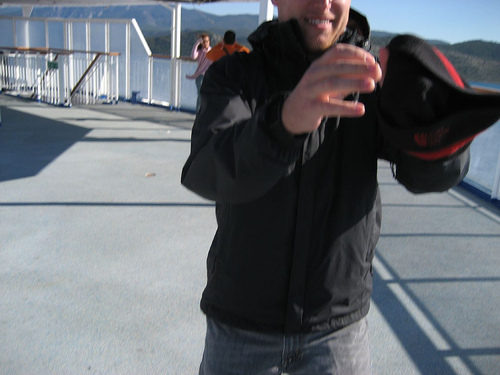My second day in Gulu started with an early morning run. I took the main road heading south out of town, and ran past literally thousands of other people walking in the opposite direction - into town (there are cars here, but the vast majority of people here have probably never ridden in one). I've tried to get out and go running in the neighborhoods in most of the countries I've visited that it was relatively safe to do so in - Zimbabwe, Zambia, Mozambique, and here in Uganda. You're the subject of much attention, which feels a little awkward, but its fascinating to see how these people live every day, up close. Breath the same rotten air from the trash heaps and fires, tread the same pothole-pocked road and red dirt berms, hear the same sounds and see the same slum neighborhoods that they live in. It makes you want to be able to do more, when you see these conditions.
Once at the CoW centre I met up with Dora, one of the field-work coordinators. One of Dora's primary responsibility is the coordination and training of the Community Volunteer Caregivers (CVC's) who are conducting what is referred to as Interpersonal Psycho Therapy Groups (IPTGs). This includes the pre-assessment in the community for the need for a group, the identification of CVCs to do the work, on-going status updates with the CVCs, and after-program reporting. I'm sure there's much more involved than that.
IPTG is basically a small group of 8-12 former abducted children, receiving group therapy primarily in the context of talking with the group about their problems, i.e. family problems, recurring nightmares, inabilities to get proper education, inability to find work, etc.. My gut reaction was "how does sitting around talking with others with the same problems help?" and my next thought was "you don't know much about therapy, do you, dummy?" It became quickly apparent that these programs are very effective. IPTG groups are currently being carried out in many different areas across 8 sub-counties in Northern Uganda, and the long-term goal is to move the management of these groups from the CoW centre into the actual field programs, or Area Development Programs (ADPs), as World Vision refers to them.
Interestingly enough, the main problem for rehabbed child soldiers is poverty. There's certainly not the money available to most of the to receive anything nearing a normal education, and one can only imagine the prospects for a generation lacking that basic building block. Bigger problems arise, however, for those who have ongoing medical issues and disabilities - money for basic treatment can often be a problem. Part of the CoW's ongoing community work is trying to find enough support for these children to see specialized doctors, get needed operations, be fitted with specialized orthopedics (one big European org helping out in this particular area is AVSI, providing such orthopedics at subsidized rates for artificial limbs, raised shoes, etc.).
For these unhealthy kids, even if education were a possibility, they likely wouldn't be able to attend as regularly as their peers, and so they often miss out on even the basic vocational skills training that the CoW programme runs. Dora is currently working on a sample proposal for a group out of Australia called Trust Charity Fund (TCF) to support: 1) Ongoing medical support, 2) Seed money for affected children to start small businesses, and 3) Shelter support within the communities for such children.
Dora's work covers a relatively massive area across 4 districts in northern Uganda - Gulu, Kitgum, Pader, and Arua. She pointed out a few more distressing facts about the work in these areas:
- Many of the children returned to the community are actually children who were born in captivity, often returning without their parents, who were likely still part of the army, or deceased. These children are often returned to their grandparents, who because of their age often particularly struggle to support both themselves and these new children. No current funding exists for grandparents like these (World Vision, for one, has more than it can handle just working with the children).
- Funding from the US directed towards formal education totals to a paltry sum - enough for only 20 children a year in northern Uganda. This funding, further, is only applied to through the first year of secondary school, after that the kids are left to their own devices. World Vision secures funding for all kinds of other work, of course - the CoW work, food programmes, etc.. But that's the extent of the education funding. (The cost of the War in Iraq, by the way, is now over half a trillion dollars - that's a 5, followed by 11 zeros.)
- Parental responsibility in the communities is often a huge problem, as the parents often are not taking a pro-active stance in caring for their children. I found this both distressing and yet somewhat understandable for a people in such dire times - often it is hard for a parent to garner enough sustenance for themselves, let alone the child. That would make me struggle with depression, I'm sure. Many of the women do what's referred to as "awara" - buying vegetables and other goods in small bulk in the towns, walking them back out to the camps, and re-selling them there. Many of the men stay home and drink. Many of the children are left alone. Dora felt that in general there was altogether too much dependence on the NGO's to care for the children rather than the families and communities.
After meeting Dora, I met Sam. Sam and I talked for a minute and then rushed off to a Child Protection Committee (CPC) meeting. The CPCs are government-established groups of community leaders in a given sub-county (with a given number of parishes within each sub-county). Sam was helping to facilitate the Bungatira sub-county CPC meeting, along with a counter-part from UNICEF. Different sub-counties work with whichever NGOs in particular are doing work there, hence WV works with a number of different NGOs in the various sub-counties where they have operations. The purposes of this meeting were to do an overview of the CPC, discuss its composition (there have been some recent changes in what type of community leaders should be involved), discuss the current issues (3 of the 7 parishes in Bungatira have still not returned from the IDPs to their villages), and discuss the 2008 strategies for the CPC.
The issues discussed were already becoming commonplace in my mind: young mothers, child-headed households, discrimination, domestic violence, exploited child labor, school drop-outs, suicide, inability to conduct follow-up and reporting, and inadequate numbers committee members to serve the communities. Much of the meeting was conducted in the local Luo language, but I gathered what little I could from Sam afterwards.
Sam works primarily in the technical guidance, administration, and organization of the CPCs that WV is involved with in n. Uganda. His work involves liaising with many of the other NGO's operating in the area (and, thankfully, there are many), as well as government representation helping to organize the efforts. While the CPCs handle some smaller community issues on their own, their primary directive is to identify orphans and vulnerable children for support, and refer them to the proper NGO. In this respect, although the needs vary by communities, its estimated that 70-80% of such children are served at least in some way.
In the afternoon, Dora took me with her for a CVC (keeping up with the acronyms here?) update meeting in an IDP camp about an hour outside of the town of Gulu (by the way, most of the districts are named after the capital city of the district, hence we were still in the district of Gulu). The IDP camp I hope to describe better in pictures at some point than I can in words - basically endless mud huts for thousands of people, clustered together in a large group that you can almost smell the fear in. They are quiet, and they are huge.
The gist of the CVC update: more problems. Everywhere, problems. Problems creating more problems. Children dropping out of school or even out of group therapy, families leaving the IDP camps for midway points between the village and the camp (known as "decongestion camps") - causing the children to have to walk long distances for schooling, a child mother who attempted her own abortion, diseases abruptly spreading in certain communities, at some point its hard not to become numb.
At the end of day 2 I sought out a younger shop-keeper in town named Frederick, one of the very, very few from the community that found a way to move through university successfully and return to the community to start his own business (mainly water engineering, building wells and the like, although he's trying to expand into a number of other areas). I wanted to ask him about where I could go for a good meal in Gulu, and he insisted on touring me around the town on his motorbike, showing me all of the best places, the place I ate at the first night being among them, to my dismay. He insisted that we have dinner together (and he would insist, despite my protests, on paying - in typical Ugandan graciousness) and so we did - a skinny chicken leg and some fries.
It began to dawn on me at his point that there really weren't any fat people here. Anywhere. Hadn't seen one that I could remember. Comparatively speaking, to most in Gulu, and probably most of Uganda, we were eating like kings. And I went to bed feeling what I've always called "hunger," but questioning whether I ever really had experienced the real thing.
The Empty House Studio
10 years ago















1 comment:
What are the ages/age range of the children you are seeing here?
(By the way, I log in as anonymous because I don't know any other way to log in, sort of a dolt in that respect! =) )
val
Post a Comment